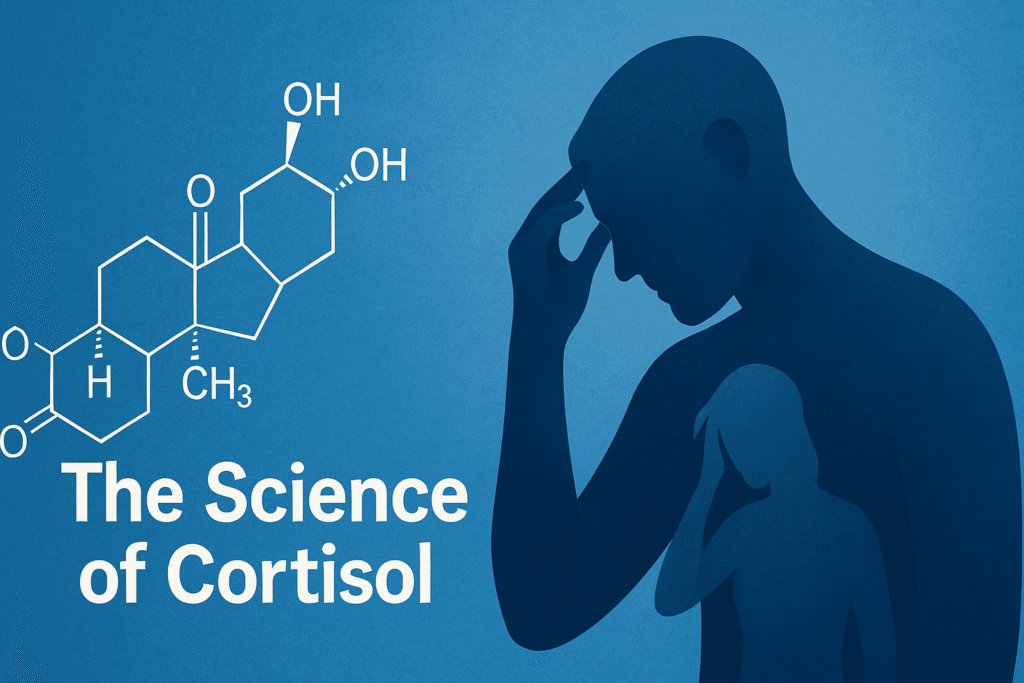Introduction: Beyond the Buzzword
Cortisol is one of the most misunderstood hormones. Popular media labels it as “the stress hormone,” but that oversimplifies its role. Cortisol is a glucocorticoid produced by the adrenal glands and regulated by the hypothalamic-pituitary-adrenal (HPA) axis. It’s vital for survival—helping us respond to stress, regulate metabolism, and control inflammation.
The challenge is not cortisol itself, but dysregulation. When levels remain too high or too low for too long, it contributes to fatigue, weight gain, insomnia, cardiovascular risk, and even impaired immune response.
The Physiology of Cortisol
- Production site: Adrenal cortex (zona fasciculata).
- Trigger: Stress signals → hypothalamus releases CRH → pituitary releases ACTH → adrenal glands secrete cortisol.
- Circadian rhythm: Peaks in the early morning (~8 a.m.) and declines throughout the day, reaching its lowest point at midnight.
- Half-life: Approximately 60–90 minutes in circulation.
Key Functions
- Metabolic regulation: Increases glucose availability via gluconeogenesis.
- Immune modulation: Anti-inflammatory in short bursts; immunosuppressive when chronic.
- Stress adaptation: Increases alertness and blood pressure, diverts resources from nonessential functions.
- Cognition: Influences memory consolidation, particularly emotional events.
Cortisol and Health: What Science Shows
1. Metabolic Effects
Chronically elevated cortisol is linked to insulin resistance, visceral fat accumulation, and type 2 diabetes. Studies (e.g., Rosmond, 2005; Kyrou & Tsigos, 2009) demonstrate that long-term stress hormones push the body toward a metabolic state favoring fat storage.
2. Immune Function
Short-term spikes reduce inflammation (the rationale behind synthetic corticosteroids). But chronic exposure suppresses immunity, increasing susceptibility to infections and slowing wound healing.
3. Cognitive and Emotional Health
Excess cortisol impairs the hippocampus, affecting memory and emotional regulation. High cortisol correlates with anxiety, depression, and sleep disorders. Low cortisol, on the other hand, is seen in burnout and chronic fatigue syndrome.
4. Cardiovascular Health
Elevated cortisol raises blood pressure, alters lipid metabolism, and is associated with higher risk of hypertension, atherosclerosis, and heart disease.
5. Reproductive Health
In women, cortisol dysregulation can disrupt estrogen and progesterone balance, contributing to irregular cycles, infertility, and PCOS-like symptoms. In men, chronic stress lowers testosterone.
Measuring Cortisol
Cortisol can be measured in blood, saliva, urine, and even hair.
- Serum tests: Reflect total cortisol but fluctuate rapidly.
- Salivary tests: Capture circadian rhythm (multiple samples in a day).
- Urinary free cortisol: Reflects overall production over 24 hours.
- Hair cortisol: Long-term marker (months of exposure).
Evidence-Based Strategies to Balance Cortisol
- Sleep Optimization
Studies confirm that even partial sleep deprivation raises cortisol the next day. Aim for 7–9 hours, aligned with circadian rhythm. - Mind-Body Interventions
Meta-analyses show that mindfulness meditation, yoga, and breathing exercises significantly lower salivary cortisol. - Exercise (but balanced)
Moderate physical activity lowers baseline cortisol, while overtraining raises it. The key is recovery. - Nutrition
- High-glycemic diets spike cortisol.
- Magnesium, omega-3s, and polyphenol-rich foods (berries, dark chocolate) have shown cortisol-lowering effects.
- Caffeine increases cortisol, especially when sleep-deprived.
- Social Connection
Research shows that social bonding and positive relationships buffer cortisol spikes. Oxytocin, the “bonding hormone,” counteracts stress response.
Cortisol Disorders: When to Seek Medical Help
- Cushing’s syndrome: Excess cortisol (tumors or medications) → weight gain, “moon face,” muscle weakness.
- Addison’s disease: Cortisol deficiency → fatigue, weight loss, low blood pressure.
- Adrenal fatigue (controversial): Popular term without strong scientific backing; symptoms often overlap with other conditions.
Key Takeaway
Cortisol is not the enemy—it’s essential for life. The real danger lies in chronic imbalance. By aligning lifestyle habits with the body’s natural rhythms and seeking medical advice when needed, it’s possible to harness cortisol’s protective power without falling victim to its destructive side.


Sophia Martinez has a Master’s degree in Public Health and over 10 years of experience in digestive wellness and preventive health. She enjoys sharing practical, science-backed tips that readers can apply in everyday life. Sophia believes that better digestion and less stress are key to long-term well-being.

